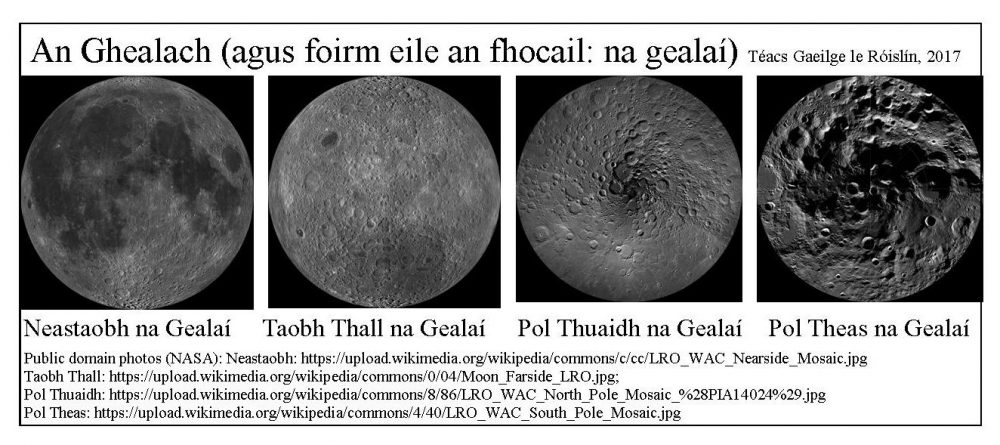Discussing The Moon and Eclipses in Irish: Foirmeacha an Fhocail ‘Gealach’ agus Lánuruithe i 2018 agus i 2019 Posted by róislín on Aug 8, 2017 in Irish Language
(le Róislín)
Our last blogpost was on the following topic: lánurú na gréine le feiceáil i Meiriceá ar 21 Lúnasa 2017 (nasc thíos). Today we’ll talk about the moon and two upcoming eclipses that will be visible in Ireland (de réir timeanddate.com, nasc thíos). Not that we’ll really be waxing astronomical (ní réalteolaí mé!) but just from a language viewpoint, mostly involving “an tuiseal ginideach” (gealach vs. na gealaí).
So let’s start with the word “gealach” (moon). Here are some of its forms:
an ghealach, the moon. For newcomers to Irish, remember this “gh” sound is like a “y,” no “g” sound and no “h” sound. So it’s like “yal” but rhyming with “pal” or “gal.”
na gealaí, of the moon. Why such a change in spelling at the end of the word? Well, before the irish spelling reform (1950s), “na gealaí” used to be spelled “na gealaighe.” The “gh” substituted for the “ch” of “gealach,” so you could still see more of a correspondence is spelling. The whole “-aighe” ending was pronounced “ee,” just like the “-aí” ending of the modern spelling “gealaí.”
na gealacha, the moons
na ngealach, of the moons
Agus anois, cúpla abairt faoi “na huruithe.”
- a) Beidh lánurú na gealaí le feiceáil in Éirinn ar an 27ú lá agus an 28ú lá de mhí Iúil sa bhliain 2018.
- b) Beidh lánurú na gealaí eile le feiceáil in Éirinn ar an 21ú lá de mhí Eanáir sa bhliain 2019.
It’s worth noting that for every example I’ve found in my cursory search for this blog, “lunar” is expressed by using “moon” as a noun (an eclipse of the moon, a crater of the moon, the surface of the moon, not, literally, lunar eclipse, lunar crater, or lunar surface, the latter two being cráitéar gealaí and dromchla na gealaí). This usage is referred to as an attributive noun and note that the ending “-aí” means we’re really saying “of the moon” or “of moon,” depending on the context.
Tuilleadh cleachta uait? Here are a few examples of statements using the word” moon,” with blanks for you to fill in. The blank does not indicate the length of the word to be filled in and two of the sentences also refer to another “corpán spéire.”
1). Is as Tatooine mé. Tá trí _______ ag mo phláinéad: Ghomrassen, Guermessa, agus Chenini. Agus dála an scéil, dhá _______ (Tatoo a hAon agus Tatoo a Dó).
Hmm, is dócha go raibh George Lucas ag foghlaim Gaeilge: Conas a “tatoo.”
2). Gheallfadh siad _______ is _______ daoibh.
3). For this one I’m going to provide the form of the word “gealach” but the challenge will be to figure out what to say for the word between “tafann” (barking) and the definite article (“an” for “the” and “na” for “the — plural”):
Bíonn a lán madraí ag tafann _______ an ngealach. Ach bíonn mo mhadrasa ag tafann _______ na balúin aer te freisin.
4). Tá _______ Iúpatair an-álainn ar fad.
5). And in case you’re wondering, “mooning about” in Irish doesn’t include any form of “gealach.” But for an additional “dúshlán,” how would you fill in this sentence:
Bhí siad ag _______ thart. They were mooning about (either wasting time or loafing, if we can split-hairingly establish a difference).
Bhuel, sin é, an focal “gealach” agus foirmeacha an fhocail agus cúpla comhthéacs. Slán go fóill agus tá na freagraí thíos. – Róislín
Naisc: Lánurú na Gréine: Some Irish Words for Discussing Eclipses Posted by róislín on Jul 31, 2017 in Irish Language
https://www.timeanddate.com/eclipse/in/ireland/dublin
Freagraí:
1). Is as Tatooine mé. Tá trí ghealach ag mo phláinéad: Ghomrassen, Guermessa, agus Chenini. Agus dála an scéil, dhá ghrian (Tatoo a hAon agus Tatoo a Dó).
Hmm, is dócha go raibh George Lucas ag foghlaim Gaeilge: Conas a “tatoo.”
2). Gheallfadh siad grian is gealach daoibh. They would promise them the sun and the moon.
Note that “sun” and “moon” are indefinite in Irish (simply “grian is gealach,” lit. sun and moon) but definite in English (“the sun” and “the moon”)
3). Bíonn a lán madraí ag tafann leis an ngealach. Ach bíonn mo mhadrasa ag tafann leis na balúin aer te freisin.
4). Tá gealacha Iúpatair an-álainn ar fad.
5). Bhí siad ag crochadh thart. They were mooning about (either wasting time or loafing, if we can split-hairingly establish a difference). Lit., they were “hanging” about.

Build vocabulary, practice pronunciation, and more with Transparent Language Online. Available anytime, anywhere, on any device.





Leave a comment: